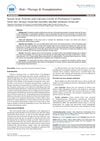 7 citations,
December 2020 in “Clinics in Dermatology”
7 citations,
December 2020 in “Clinics in Dermatology” Some alopecia treatments might help treat COVID-19, but more research is needed.
 3 citations,
November 2020 in “Biological Trace Element Research”
3 citations,
November 2020 in “Biological Trace Element Research” Men with hair loss may lack zinc, copper, and vitamin D; supplements could help.
 August 2024 in “Applied Sciences”
August 2024 in “Applied Sciences” Plant extracts may help prevent or reverse hair graying.
 July 2023 in “The Journal of Clinical Endocrinology and Metabolism”
July 2023 in “The Journal of Clinical Endocrinology and Metabolism” Gender-affirming hormone therapy improves physical performance in trans men to the level of cisgender men, while in trans women, it increases fat mass and decreases muscle mass, with no advantage in physical performance after 2 years.
 95 citations,
November 2016 in “Journal of The American Academy of Dermatology”
95 citations,
November 2016 in “Journal of The American Academy of Dermatology” Treatments for permanent hair loss from scarring aim to stop further loss, not regrow hair, and vary by condition, with partial success common.
 84 citations,
November 2003 in “European journal of endocrinology”
84 citations,
November 2003 in “European journal of endocrinology” Women with androgenic alopecia are more likely to have polycystic ovaries and higher androgen levels, which may indicate PCOS.
 30 citations,
November 2012 in “Anais Brasileiros De Dermatologia”
30 citations,
November 2012 in “Anais Brasileiros De Dermatologia” Diagnosing diffuse alopecia, a hair loss condition, can be challenging and may require a scalp biopsy or tracking the disease's progression when symptoms and skin tests aren't enough.
 3 citations,
May 2018 in “Journal of nutritional health & food science”
3 citations,
May 2018 in “Journal of nutritional health & food science” Nutritional supplements can help manage hair loss and promote hair growth by strengthening hair roots and countering harmful effects of pollution, smoking, and deficiencies in vitamins and minerals.
 May 2024 in “Pakistan Journal of Health Sciences”
May 2024 in “Pakistan Journal of Health Sciences” Iron deficiency is linked to hair loss in CTE patients.

The document provides 70 multiple choice questions to improve haematology skills.

The document tests knowledge and decision-making in hematology through multiple-choice questions.
 January 2023 in “Springer eBooks”
January 2023 in “Springer eBooks” Hair shedding that lasts over 6 months may need a closer look, but often just reassurance is enough.
 January 2015 in “Springer eBooks”
January 2015 in “Springer eBooks” Hair shedding that lasts more than 6 months may need medical tests, but often just reassurance is enough.
August 2024 in “Jordan Medical Journal” Picky eating in children is linked to lower weight, hemoglobin, vitamin D, and zinc levels.
 December 2021 in “Acta Marisiensis”
December 2021 in “Acta Marisiensis” Insulin resistance increases the risk of developing type 2 diabetes and other health issues.
 13 citations,
January 2015 in “International Journal of Trichology”
13 citations,
January 2015 in “International Journal of Trichology” Higher lead and cadmium, and lower zinc and iron levels in the blood might be linked to chronic hair loss in women.
 December 2024 in “Nutrients”
December 2024 in “Nutrients” Skin, hair, and nail changes can help detect eating disorders early.
 December 2023 in “Redox biology”
December 2023 in “Redox biology” The substance DMC helps get rid of aging cells by triggering a process that causes cell death, which could treat age-related diseases.
 January 2015 in “Indian Journal of Medical Biochemistry”
January 2015 in “Indian Journal of Medical Biochemistry” Men with early balding should be checked for metabolic syndrome, as there's a link between the two.
 2 citations,
November 2022 in “Bioscience Reports”
2 citations,
November 2022 in “Bioscience Reports” Polycystic ovary syndrome and iron overload share similar symptoms and can be potentially treated with blood removal, diet changes, and probiotics.
 1 citations,
October 2020 in “IP Indian journal of clinical and experimental dermatology”
1 citations,
October 2020 in “IP Indian journal of clinical and experimental dermatology” Low serum ferritin levels are significantly linked to diffuse hair loss.
January 2019 in “Türkiye klinikleri dermatoloji dergisi” Low levels of iron, ferritin, zinc, and folic acid may contribute to hair loss in women.
 4 citations,
July 2019 in “IOP conference series”
4 citations,
July 2019 in “IOP conference series” Most young men with early gray hair have low vitamin D but normal iron levels.
 1 citations,
January 2021 in “International journal of pharmaceutical research”
1 citations,
January 2021 in “International journal of pharmaceutical research” Low levels of ferritin, TSH, and certain vitamins are linked to hair loss in women of different ages.
 January 2022 in “Indian journal of dermatopathology and diagnostic dermatology”
January 2022 in “Indian journal of dermatopathology and diagnostic dermatology” Women with diffuse hair loss often have lower iron and vitamin D levels, but their thyroid function is typically normal.
13 citations,
September 2009 in “Heart & Lung” Kawasaki's disease can occur in adults and should be considered with specific symptoms and high ferritin levels.
 January 2016 in “International Journal of Research in Medical Sciences”
January 2016 in “International Journal of Research in Medical Sciences” Low iron, low thyroid function, and stress are linked to excessive hair shedding in women.
Raising serum ferritin levels can improve symptoms like fatigue and hair loss, even if hemoglobin levels are normal.
 January 2012 in “Iraqi postgraduate Medical Journal”
January 2012 in “Iraqi postgraduate Medical Journal” Serum ferritin is a better indicator than hemoglobin for detecting low iron in women with chronic hair loss.
 7 citations,
January 2016 in “Hair therapy & transplantation”
7 citations,
January 2016 in “Hair therapy & transplantation” People with early graying hair often have lower levels of iron, ferritin, and calcium.


























